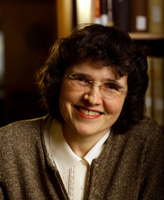Medievalist Kathryn Kerby-Fulton Receives NEH Grant

Kathryn Kerby-Fulton, professor and Notre Dame Chair in English, has been awarded a grant from the National Endowment for the Humanities (NEH) for her book project titled Professional Reading Circles, the Clerical Proletariat, and the Rise of English Literature. Her work was also supported by a grant from the John Simon Guggenheim Memorial Foundation.
This research is inspired, she says, by the idea that unemployed or underemployed people with an education can change the course of history.
“The project studies the role of the clerical proletariat—those trained for the church but unable to find employment in it—in the rise of English literature,” Kerby-Fulton says.
Emerging Influence
Even though literary giants such as Geoffrey Chaucer and William Langland produced their most mature works under the rule of Richard II, Kerby-Fulton says, the king owned no books in English. In fact, English literary texts were scarce among the educated or social elite, who still preferred to read in Latin or French.
But a drastic change took place, she says, within the first generation after Richard II was deposed in 1399.
“Beginning in the reign of Edward III, London saw the immigration of a young, underemployed clerical population, trained or semi-trained for the church but unable to find employment in it—and, thus, with complex attitudes toward it—who took jobs in the burgeoning Westminster and Dublin civil and legal services,” she says. “Here, London writers found their initial, most sophisticated audiences and their coteries.
“This study attempts to account for the sudden rise of English literature by uncovering the earliest reading circles of this emergent national literature.”
Distinguished Scholarship
Kerby-Fulton specializes in Middle English literature and medieval intellectual history, including Latin political and religious writings, text-image relations, and manuscript studies—and was recently elected as a fellow in the Medieval Academy of America (MAA).
In announcing her March 2012 induction, MAA Executive Directors Eileen Gardiner and Ronald Musto praised her “distinguished contributions to medieval studies.”
In 2010, Kerby-Fulton was awarded the MAA’s Haskins Gold Medal for Books Under Suspicion: Censorship and Tolerance of Revelatory Writing in Late Medieval England, for which she also won the John Ben Snow Prize from the North American Conference on British Studies. Her other books include Reformist Apocalypticism and Piers Plowman (winner of the MAA’s John Nicholas Brown Prize in 1994) and Iconography and the Professional Reader: The Politics of Book Production in Douce Piers Plowman (with Denise Despres).
Kerby-Fulton is currently finalizing a book for Cornell University Press with coauthors Maidie Hilmo and Linda Olson. Called Opening Up Middle English Manuscripts: Literary and Visual Approaches, she describes it as “a textbook to teach students how to read medieval English manuscripts and integrate that knowledge into their literary studies.”
Learn More >
- Department of English
- National Endowment for the Humanities
- Medieval Academy of America
- John Simon Guggenheim Memorial Foundation
- Related story: Kerby-Fulton Wins 2010 Haskins Gold Medal for Books Under Suspicion
- College of Arts and Letters faculy bookshelf
Originally published by Joanna Basile at al.nd.edu on April 02, 2012.